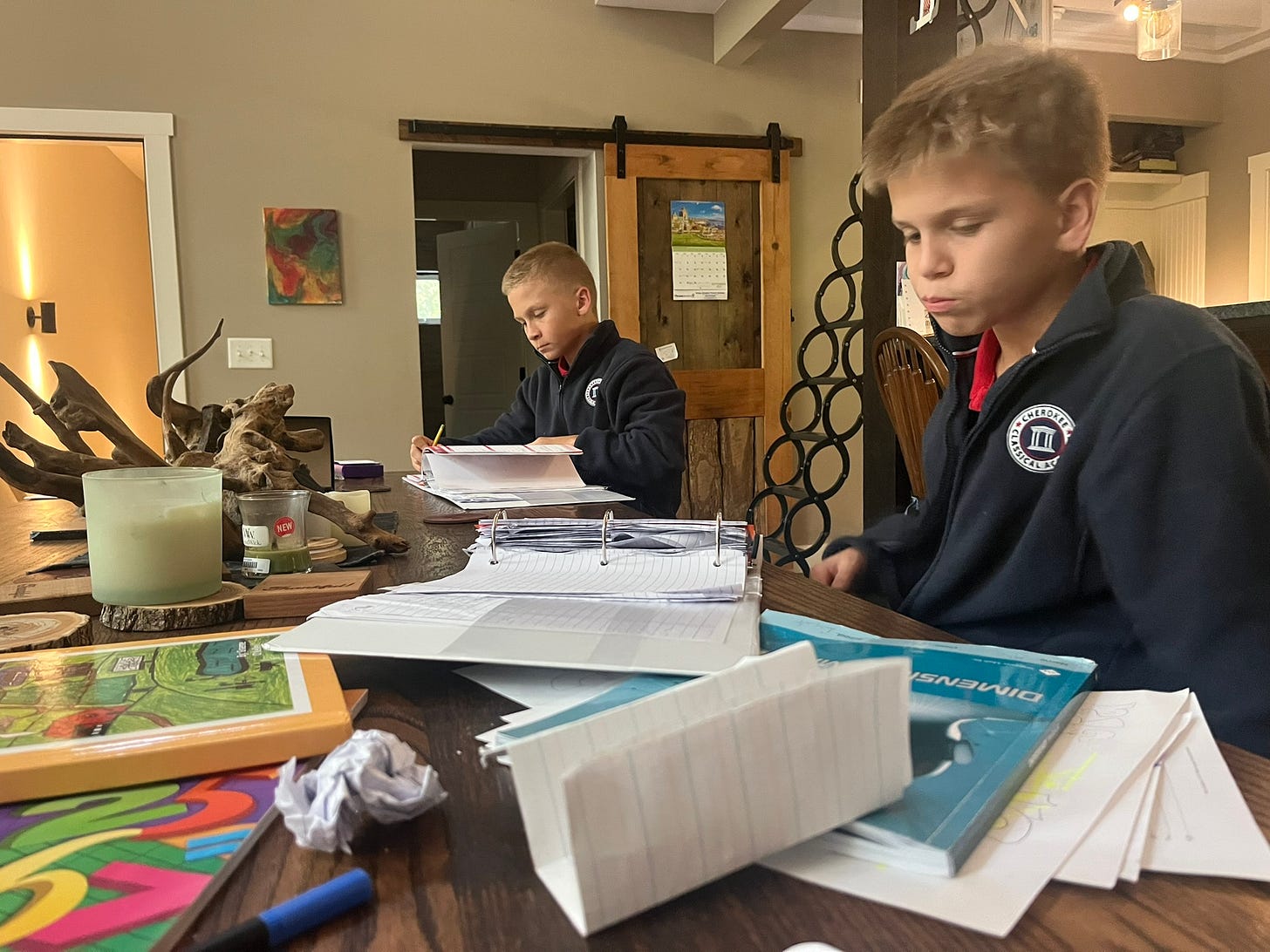Big Tech’s Classroom Takeover: Why Parents Are Right to Worry
After reading an article in The Guardian that nails the ed tech hype, I decided to put my own thoughts and words into ditching screens for something that actually builds minds
Earlier this week, I was helping one of my boys with their homework—nothing fancy, just some math problems, vocab flashcards, and some reading. No apps, no tablets, just paper, pencils, and a bit of back-and-forth conversation. It got me thinking about this recent Guardian piece by Dr. Velislava Hillman on how big tech is sneaking into schools, promising the moon but delivering data grabs and gamified distractions. As a dad raising two young sons in Georgia, where screens seem to multiply like kudzu, her warnings hit home. But while she calls for more accountability from ed tech companies, I say we go further: scrap the digital overload and embrace classical education. It’s time-tested, focuses on real wisdom over widgets, and doesn’t turn kids into data points for Silicon Valley.
Hillman’s article lays it out plain: commercial tech from Google, Microsoft, and AI outfits like Century Tech is flooding classrooms, hawking “personalized learning” while slurping up kids’ data. Kids click through apps like Duolingo or Kahoot!, chasing streaks and badges, but it’s all interrupted by ads and cookie banners—basically surveillance capitalism in a backpack. Teachers get dashboards turning students into color-coded stats, and the whole mess is sold as innovation. Sound familiar? It’s the same playbook big tobacco used: sow doubt about harms, lobby hard, and guilt-trip parents into thinking resistance means falling behind.
She’s spot on about the downsides. Studies show ed tech can widen inequality, with apps like Photomath turning math into rote copying instead of deep understanding. One review called the pandemic’s ed tech push an outright “tragedy,” with hubris leading to ambition over actual learning. Even proponents admit challenges like excessive screen time and a disconnect between what students need and what educators push. And let’s not ignore the biases: teachers often assume girls aren’t into tech, further entrenching gaps. It’s not democratizing education; it’s entrenching a divide where the elite get human tutors and the rest get algorithmic nudges designed to maximize engagement—like social media, but for homework.
But here’s where I part ways a bit with Hillman’s call for audits and oversight. Sure, hold companies accountable, but why tinker with a broken system? Government mandates and “digital rights” language just invite more bureaucracy. As someone skeptical of overreach—whether from big tech or big government—I say parents and teachers should opt out and reclaim education the old-fashioned way: through classical models that prioritize wisdom, critical thinking, and character over screens.
Why Classical Education Beats Tech-Driven “Progress”

Classical education isn’t some dusty relic; it’s a proven framework based on the liberal arts, emphasizing the trivium (grammar, logic, rhetoric) and quadrivium (arithmetic, geometry, music, astronomy). It’s about apprenticing kids to great minds from history, fostering autonomy and responsibility—not gamified clicks. Unlike modern ed tech, which often reduces learning to apps and data dashboards, classical approaches build holistic thinkers ready for the real world.
Here are a few reasons why it’s a better model, backed by what’s working out there:
Focus on Mastery and Depth Over Distraction: Classical education stresses mastery of subjects through dialogue and critical analysis, not superficial app interactions. For instance, instead of snapping equations on Photomath, kids debate ideas from Plato or solve problems with logic drills. This inspires a passion for learning that sticks. Tech-driven methods? They’ve been criticized for stripping away feedback and deepening inequalities.
Builds Wisdom and Character, Not Just Skills: In a world obsessed with STEM jobs, classical education trains minds for wisdom—meeting kids’ real needs beyond test scores. It equips students to evaluate and integrate knowledge, conquering new fields without relying on algorithms. Modern ed tech? It’s shaky on evidence, often industry-driven, and linked to wellbeing hits from excessive screen time.
Time-Tested Results in Real Schools: Look at places like Hillsdale College’s classical programs or Veritas Academy in Pennsylvania—they’re booming because they deliver. St. Benedict Catholic School nurtures intellectual and spiritual potential, inspiring critical thinking without tech overload. Even in Ohio, The Lyceum integrates classics into STEM, preparing kids better than gadget-heavy setups. Hundreds of new classical schools have opened post-pandemic, proving parents want this alternative.
Avoids the Hype and Harms of Tech: Classical models blend tech sparingly, like at Cherokee Classical Academy, for a holistic experience without the “wicked problems” of ed tech—sustainability issues, teacher disempowerment, and disrupted classrooms. It’s about becoming responsible subjects, as theorist Gert Biesta says—not monetizable data points.
My unCommon Sense
My husband and I started worrying about the amount of technology that was involved in our kids education after learning that teachers were NOT selecting all the questions for all the quizzes, tests, and homework that were all administered through the Canvas application. Some of the questions were automatically pulled from a state or national question database and when my kids answered them correctly, they were marked as wrong. When we brought it to the teachers attention, they were stunned and were unsure how that happened. Hillman’s right: parents’ instincts aren’t wrong. But instead of begging tech giants for better behavior, let’s empower families to choose the path that honors education as more than a market. For my boys, I’d rather they wrestle with great books and ideas than chase leaderboard spots. It might not be flashy, but it builds resilient, thoughtful humans—not screen-addicted consumers.
If you’ve got thoughts on ed tech, classical education, or just want to swap stories about raising kids in this digital mess, shoot me an email at dan@thrailkill.us or let’s grab coffee or a beer. Always up for a constructive chat.
Have a good one,
Dan



